Femme Friday: Ettie Shafter
Ettie Shafter
By BSB Maria
Today’s chosen lady from the Sherlock Holmes stories is one who is often overlooked, rarely discussed and almost never featured in adaptations: Ettie Shafter, a young woman living with her father Jacob in Vermissa Valley, Pennsylvania. She is one of the tragic female characters in the Canon, characterized by her tolerance and open mindedness, by her will to fight for herself and her kin and to love unconditionally.
Arthur Conan Doyle published his final Sherlock Holmes novel The Valley of Fear in 1915. Just as he does with the first two novels, Doyle creates a case which Holmes has to solve and then sets the background story abroad. In this case, the story is that of a secret agent by the name of John Douglas (aka. John McMurdo, aka. Birdy Edwards) from Chicago who infiltrates the Ancient Order of Freemen, the “The Scowrers”, Lodge 341, Vermissa Valley, Pennsylvania. The Scowrers tyrannize Vermissa Valley and those who work in the mines live in constant fear of the gang. The secret agent takes on the role of a Freemason and takes on the dangerous task of exposing the terrible doings of the Scowrers.
McMurdo looks for a place to lodge in the valley and meets Ettie Shafter, who is the daughter of a German immigrant, Jacob Shafter. The young woman appears like a beacon of light in the dark and dangerous place:
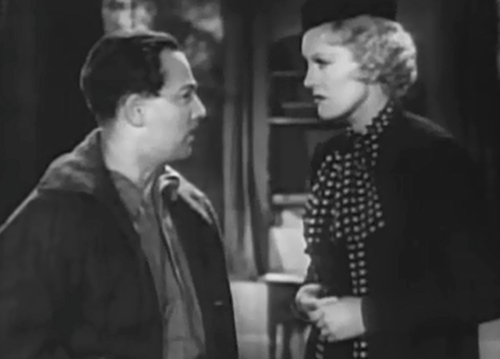
[The door] was opened at once by someone very different from what he had expected. It was a woman, young and singularly beautiful. She was of the German type, blonde and fair-haired, with the piquant contrast of a pair of beautiful dark eyes with which she surveyed the stranger with surprise and a pleasing embarrassment which brought a wave of colour over her pale face. Framed in the bright light of the open doorway, it seemed to McMurdo that he had never seen a more beautiful picture; the more attractive for its contrast with the sordid and gloomy surroundings. A lovely violet growing upon one of those black slag-heaps of the mines would not have seemed more surprising. So entranced was he that he stood staring without a word, and it was she who broke the silence. (The Valley of Fear)

McMurdo, who is used to solving murder cases and who has seen the worst in men, is speechless when confronted with the woman. Before she has even said a word, he is quite clearly in love with her. Doyle compares her to a violet, a name he used for two rather lovely independent women in the canon stories. However, all of this is of course told from a man’s perspective, and she hasn’t spoken yet.
However, when she speaks, we realize that she is quite a special young lady.
“I thought it was father,” said she with a pleasing little touch of a German accent. […]”Come right in, sir,” she said. “I’m Miss Ettie Shafter, Mr. Shafter’s daughter. My mother’s dead, and I run the house. You can sit down by the stove in the front room until father comes along — Ah, here he is! So you can fix things with him right away.” (The Valley of Fear)
She lives in a town in which everyone is scared all the time, and, as we learn later, she is promised to one of the Scowrers, and yet she trusts this stranger entirely. It is both a very stupid and a very smart move.
McMurdo is offered a place to stay and generally treated very well by Jacob until he admits to belonging to a lodge. Jacob becomes immediately hostile, whereas Ettie feels that he doesn’t belong to them, making excuses that other lodges are interested in peace and kindness. She begs McMurdo not to get involved.
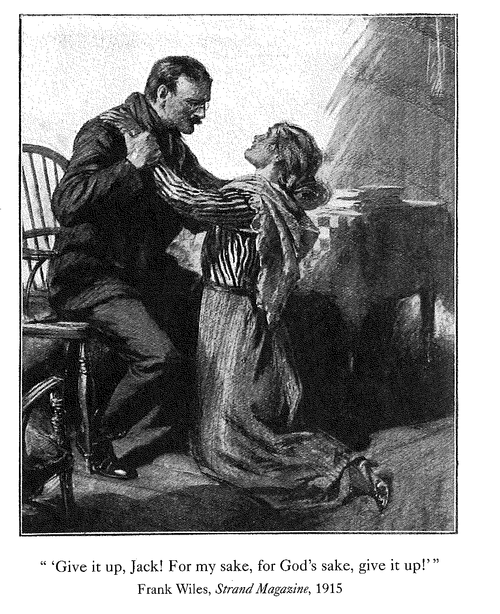
Her pleading gains more justification when McMurdo learns that she is involved with Baldwin, one of the most brutal members of the gang. It’s quite obvious that she doesn’t love him, or even like him, but that she is trying to keep the peace by not rejecting him. The appearance of McMurdo and his obvious interest in her leads to jealousy and an even more explosive climate in the valley.
One of the underlying plotlines in the story, which focuses on the gang and their evil deeds, is Ettie’s role in the conflict. The secret agent establishes himself quickly in the lodge and becomes something of a favorite of the leader, Jack McGinty. Knowing that it will make things more complicated, McMurdo lays claim on Ettie, which drives Baldwin into blind hatred and suspicion against both the new man in town and the lady.
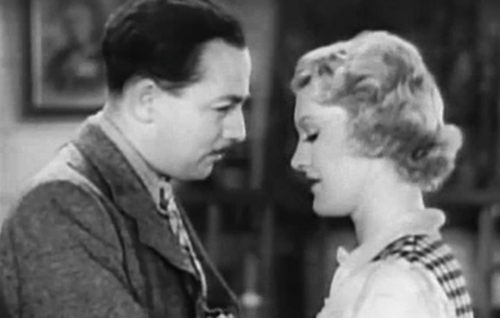
While the storyline seems to apply the damsel in distress trope, Ettie is the one who suggests to run away with McMurdo. Her plan is to take the man she feels is a better person than he lets on away from danger, and to move herself and her father out of the “valley of fear”.
While her wish is eventually and dramatically fulfilled, and they flee overnight after McMurdo proves the murderous intents of the gang, it appears that Ettie is as concerned about him as she is about her own family.
As a character, she seems quite independent and intelligent, and sees McMurdo for what he is. Her ticket out of hell.
She runs her father’s guest house, she consciously keeps the most violent men of the gang close to her in order to ensure her personal safety, and she trusts a person who seems to have trouble trusting himself.
At one point, Ettie finds McMurdo writing a letter and he reacts by violently grabbing and choking her – until he realizes who he is choking. Ettie suspects that he is writing to another woman. Since he cannot blow his own cover and tell her that he is reporting back to Chicago, he can only ask for her trust…and despite the treatment she experienced, she decides to trust him after all. It’s a highly problematic scene, and the fact that McMurdo/Edwards/Douglas is lying to her while she blindly trusts him definitely dampens the reader’s appreciation of his character.
However, I find Ettie’s trust not only naïve, but also admirable. She is an immigrant who found that her new life in the land of infinite possibilities has become a nightmare. McMurdo, despite his violent outbreak, seems the safer option than Baldwin, who is highly abusive.
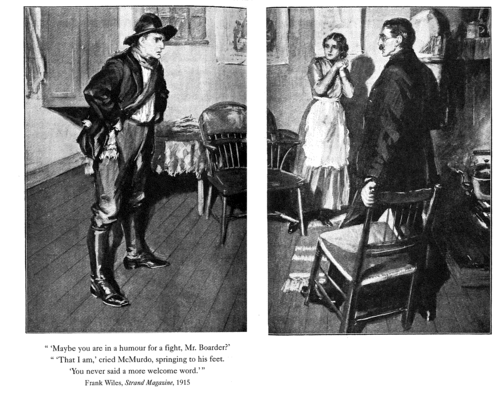
In an unsafe environment, the natural consequence would be suspicion and hate and yet, Ettie chooses to put her trust in a stranger and her trust is rewarded. They flee the valley and get married in Chicago. She doesn’t survive long, and her death casts a dark shadow over Douglas’s life.
What is striking about her is that she is a constant positive (if naive) character in the middle of this often disturbing story. Even though she has reason to believe that the man she loves is writing to other women, she remains true to him and finds a way out of her dreadful situation – even if it is only for a few short years.
Her external and internal beauty is so striking that the UK publication changed her nationality from German to Swedish, owing to the fact that England was at war with Germany by the time the story was published. She was simply too positive for a German character at that time, even if she represents one of many thousand German immigrants in the United States at the beginning of the century.
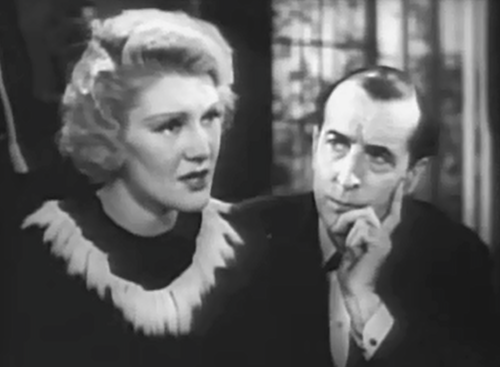
I find the character of Ettie Shafter very interesting and I would like to see her explored in adaptations and pastiches. She is mostly ignored (as is the novel) in terms of adaptations. Norma Green’s animated Sherlock Holmes adaptation of The Valley of Fear (1983), for instance, completely cuts her out of the story.
However, one adaptation gives her much more screen time than the novel offers. In The Triumph of Sherlock Holmes from 1935, Ettie appears not only in Vernissa Valley where she is presented as quite a strong young woman, but is allowed to remain alive and follow her husband to England, where she meets Holmes and Watson during their investigations. The adaptation gives Ettie a chance, which Doyle didn’t give her, and I must say that I appreciate this change very much. You can watch the whole film on youtube.

Maria teaches English Literature at Leipzig University, Germany, published a German introduction to Sherlock Holmes and is a fan of all things Holmes – but especially of the Canon stories and Sherlock BBC. Contact her at @stuffasdreams
